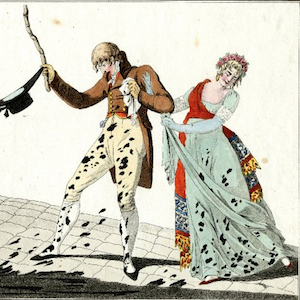Revolutions

Burning the Guardhouse on the Pont Neuf
This retrospective shows that early in the French Revolution targets were often economic. This should be no surprise as the populace had a long tradition of taking the law into its own hands to rectify what they saw as injustices.

Equality
At the beginning of the French Revolution, the term "equality" meant an end to the legal differences that had characterized the Old Regime. For example, all individuals would be subject to the same regimen of taxation.

The Assassination of Marat by Charlotte Corday
In the fall of 1793, the radical journalist was confined to his bathtub by a paralyzing skin disease he had contracted while hiding from the police in the sewers. He nevertheless continued to pour out populist tracts and remained highly influential in the sections.

Robespierre 10 Thermidor—Exposition of 1877
This painting from 1877 shows in romantic style Robespierre dying in a large room, surrounded by soldiers and others.

The Annoyance of Walking
French nobles had been used to riding in carriages or on horseback. Now, so radicals hoped, they could no longer afford to do so either financially or politically. The imagined response of this social elite reveals clearly to their attackers the worthlessness of such people.

The Blood of the Murdered Crying for Vengeance
Yet another English image promising that the death of Louis will bring havoc on the French Revolution. This engraving indicates that the very blood of the King requires vengeance.

Description of the Chouans and Other Counterrevolutionaries
The counterrevolution was a very large movement that would over time engulf different parts of France from 1793 into the Napoleonic period. But it was not one thing, for many regions of different ideologies were involved.

Revolutionary France 1799
Map of Europe in 1799 depicting Revolutionary France, territories occupied by French forces, and Sister Republics.
This source is a part of the The Napoleonic Experience teaching module.

Germaine de Staël, A French Writer Exiled by Napoleon
De Staël was the daughter of Jacques Necker, Louis XVI’s Swiss Protestant finance minister. She published novels, literary tracts, and memoirs and became one of the best-known writers of the early nineteenth century. Napoleon exiled her in 1803.

Arrival of the Royal Family in Paris on 6 October 1789
When the revolutionaries, led by thousands of women, marched to Versailles, they triumphantly seized and then brought the king to Paris, where he would live in the midst of his people.